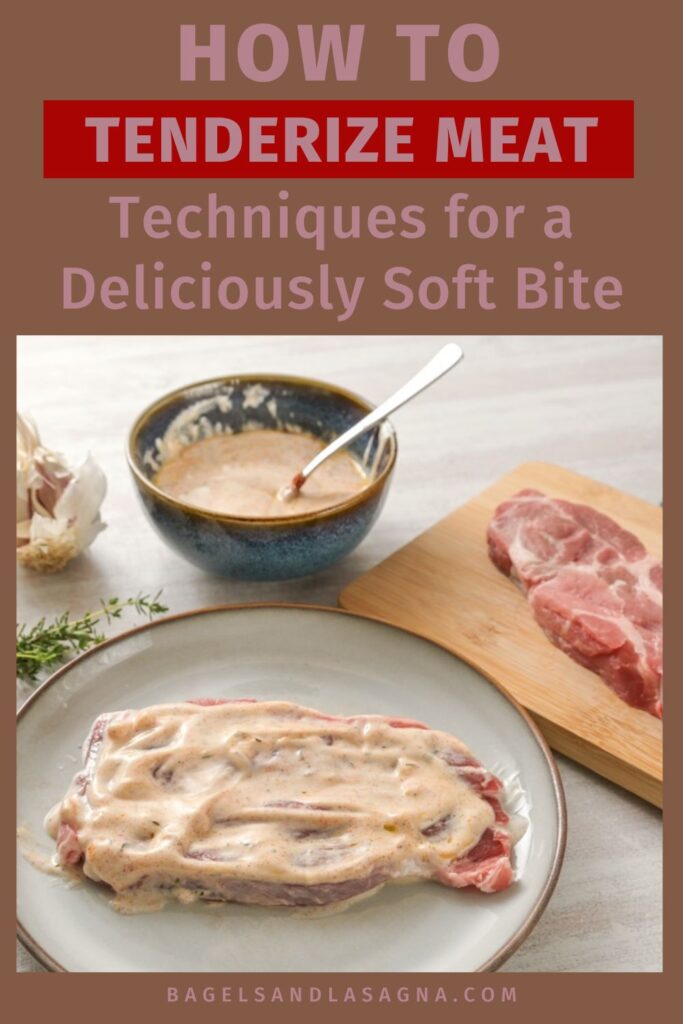How to Tenderize Meat
One of the reasons I love using my Instant Pot and also my slow cooker is they automatically tenderize meat that I might be cooking. However, these countertop appliances are hardly the only ways to do that. Read on for some really useful tips.

Why you want to tenderize meat
This page may contain affiliate links, which means I may be compensated if you click a link. However, there is no cost to you. Also, as an Amazon Associate, I earn from qualifying purchases. For more info, please see my Privacy and Disclosure page.
Currently, the price of any meat is just too high for catastrophic cooking failures. Tenderizing makes sense for cheaper cuts of meat, especially if you’re also planning on adding flavor to the meat during the process. It’s just one more way to stretch your food budget a little further.
There are several ways to get better results when cooking meat. To tenderize meat, use the one that works best for you or that incorporates the ingredients or tools you have on hand.

Mechanical tenderizing
Mechanical tenderizing can help make meat thinner and break down muscle to make it more tender and easy to cut. These are the common ways to use mechanical tenderizing on cuts of meat like a round steak or other tough cuts of beef.
- Pounding meat with a mallet or rolling pin breaks down the fibers.
- Scoring involves making shallow cuts across the surface to break up muscle fibers.
- Needling uses a specialized tool with small blades or needles to puncture the meat.
Brining
You probably think about brining and your Thanksgiving turkey. Well, brining works to tenderize meat, too.
Besides water, there are two common ingredients used in brining — salt and sugar. Salt is essential for brining. It helps break down protein structures and enhance moisture retention. You can add salt or soy sauce to marinades; both work to break down meat. Salt is also important for flavor. On the other hand, sugar adds flavor and can enhance browning during cooking.
Salmon and pork chops all benefit from brining before cooking. Brining itself is rather easy. It only involves mixing the brine, submerging the meat and keeping it all cold.
Marinating
Marinating is a common way to quickly tenderize meat and add flavor. Many different ingredients will tenderize meat when added to a marinade; acids and enzymes are the most common.
There are many ingredients to choose from to make an acidic marinade. Shruthi Baskaran-Makanju of Parallel Plates always uses yogurt. It’s what she learned growing up in India. “The lactic acid breaks down proteins, making the meat tender and flavorful,” she explains. “It’s a go-to for marinating dishes like tandoori chicken and kebabs, adding a rich, tangy taste that really enhances the overall flavor.”
There are many other go-to marinades. These include lemon juice, wine and buttermilk. Also, try vinegar — be it apple cider balsamic or white vinegar. They all work.
Adds Michelle Price of Honest and Truly, “Cheap cuts of meat can be tough unless you cook them right, and I almost always start out with a marinade that has a good acidic base that helps tenderize the meat and make it perfectly flavorful in my favorite recipes.”
Enzymatic tenderizing
Another way to tenderize meat with ingredients is using enzymatic ingredients. These ingredients break down muscle fiber, making meat more tender naturally.
If using these ingredients, be sure not to leave them in too long; they can make meat too soft if you do. You can make enzymatic marinades from:
- Papain, found in papaya.
- Bromelain, found in pineapple.
- Actinidin, found in kiwi.
How some ingredients tenderize meat
When making your own marinade or brine and deciding what ingredients to use, consider how each ingredient breaks down meat fibers. Then, choose the ones you want to include in your marinade. Your secondary consideration when choosing ingredients is what your final flavor profile will be; pick ingredients accordingly.
Beer and wine can add flavor and some tenderizing effects due to their acidity and enzymatic properties. Both can add depth and complexity to marinades, enhancing the overall flavor of the meat.
Some final tips on tenderizing meats
Be sure to avoid over-marinating with acidic ingredients, as they can make the meat mushy. Typically, 30 minutes to two hours is sufficient. If you’ve refrigerated your marinated meat or brined it in the refrigerator, let the meat come to room temperature for the best cooking results.
So the next time a potluck, bbq or fancy dinner is on the schedule, remember all the ways you can take a not-so-tender cut of meat and make the most of it. Your guests will thank you, and so will your pocketbook.
Here are 9 ways of tenderizing meat.
Portions of this article originally appeared on Food Drink Life.
